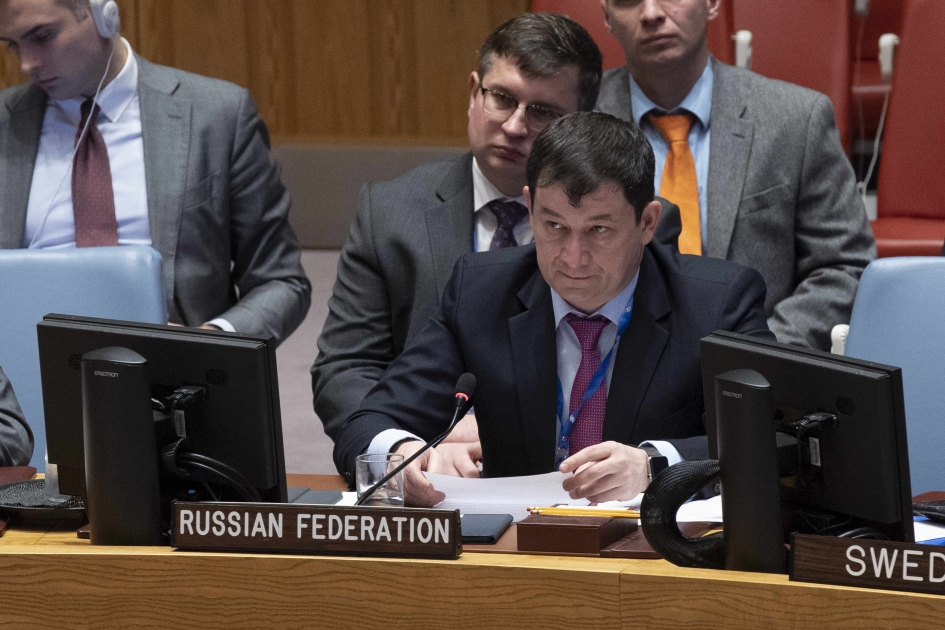Statement by Mr.Dmitry Polyanskiy, First Deputy Permanent Representative of the Russian Federation to the United Nations, at the Security Council on the situation in DR Congo
We thank Ms. Leila Zerrougui, Special Representative of the Secretary-General, for her thorough briefing on the situation in the Democratic Republic of the Congo and the preparations for the elections to be held on 23 December. We also take note of the statement by Ms. Joséphine Mbela.
We continue to believe that holding the planned elections according to schedule will help reduce the political tensions in the Democratic Republic of the Congo. As is evident in the Secretary-General’s latest report (S/2018/886) and as we all had the opportunity to see for ourselves during the Security Council mission to the Democratic Republic of the Congo, the technical and legislative groundwork for the elections is happening in line with the Independent National Electoral Commission’s electoral calendar.
It is important that once the electoral rolls had been audited, a final version, without duplications or inaccuracies, was published. We have noted the publication of the final lists of candidates, and we are pleased that half of the country’s political parties have signed the election code of conduct. The political contest in the Democratic Republic of the Congo is intensifying and its political forces are consolidating. In that regard, we call on the Congolese parties to adhere to the comprehensive political agreement of 31 December 2016.
We do not deny how important it is to ensure that the Congolese authorities step up their implementation of confidence-building measures, and that also applies to the so-called emblematic cases mentioned in the political agreement regarding political actors living abroad. We once again call for respect for the sovereignty and laws of the Democratic Republic of the Congo.
At the same time, we urge the opposition forces to abandon negative agendas, play by the established rules of the game and respect decisions already handed down by the Congolese judicial bodies. The question of the fairness of such decisions is not part of the Security Council’s remit, although for the sake of fairness, we should point out that in reviewing lawsuits about electoral issues, the Constitutional Court has already reached verdicts in favour of opposition parties.
We urge colleagues not to obsess about the situation regarding the Electoral Commission’s decision to use electronic voting machines, which is the sovereign prerogative of the relevant Congolese bodies. As we were able to see at first-hand during the Security Council’s visit, they are essentially printing devices for ensuring the rapid output of ballots in a compact form. It is our understanding that the Electoral Commission is already making logistical preparations for the holding of elections.
We agree that it is essential to ensure that Kinshasa provides reliable funding for the electoral process in order to avoid disruptions. We respect the Government’s decision to rely mainly on its own resources in dealing with this issue and note that the next instalment of funds for pre-election needs was disbursed in October.
However, we also want to point out that the logistical capabilities of the United Nations Organization Stabilization Mission in the Democratic Republic of the Congo (MONUSCO) should not be forgotten. As we understand it, the Mission’s role in organizing and conducting elections should not go beyond the mandate established in resolution 2409 (2018). The protection of civilians in the context of elections must be carried out with full respect for the basic principles of peacekeeping and without any interference in Kinshasa’s internal affairs. I want to emphasize that the elections by themselves will not be able to resolve every single one of the Democratic Republic of the Congo’s problems. We must focus on addressing the underlying causes of the crisis.
We urge everyone not to forget about the importance of continuing to fight the illegal armed groups in the east of the country, which still pose a threat to civilians and are capable of destabilizing the Great Lakes region. We definitely believe that solving that problem should be seen as the main indicator for the country’s stabilization and the withdrawal of MONUSCO, whose chief function, after all, is dealing with the security situation. It will be impossible to stabilize the situation in the eastern parts of the Democratic Republic of the Congo through military measures alone.
The implementation of the Peace, Security and Cooperation Framework for the Democratic Republic of the Congo and the Region must continue, along with assistance in strengthening State governance institutions and restoring social institutions in areas that have been liberated from the insurgents.
